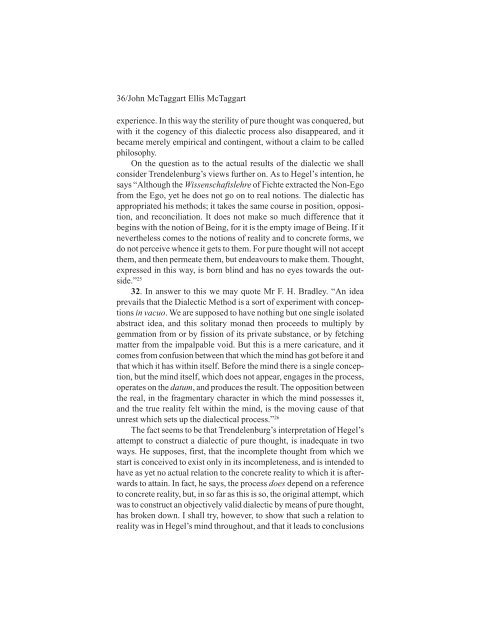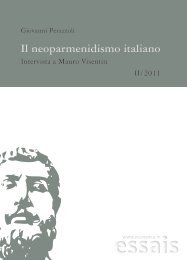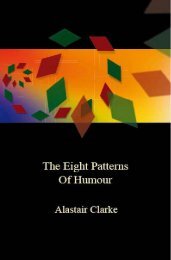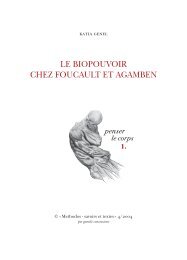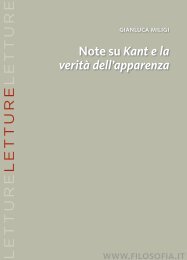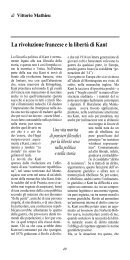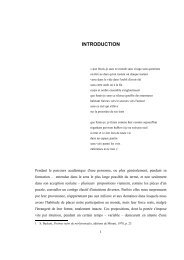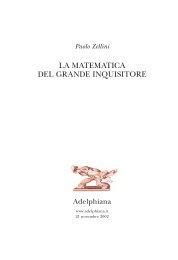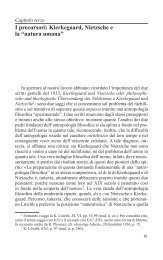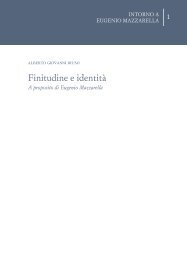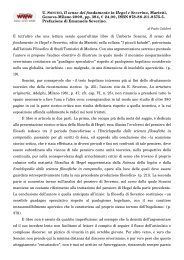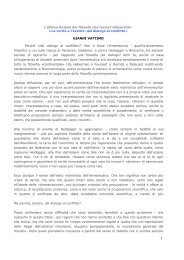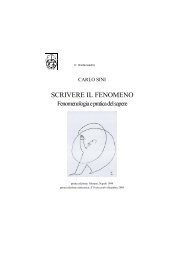McTaggart, Studies in the Hegelian Dialectic
McTaggart, Studies in the Hegelian Dialectic
McTaggart, Studies in the Hegelian Dialectic
Create successful ePaper yourself
Turn your PDF publications into a flip-book with our unique Google optimized e-Paper software.
36/John <strong>McTaggart</strong> Ellis <strong>McTaggart</strong><br />
experience. In this way <strong>the</strong> sterility of pure thought was conquered, but<br />
with it <strong>the</strong> cogency of this dialectic process also disappeared, and it<br />
became merely empirical and cont<strong>in</strong>gent, without a claim to be called<br />
philosophy.<br />
On <strong>the</strong> question as to <strong>the</strong> actual results of <strong>the</strong> dialectic we shall<br />
consider Trendelenburg’s views fur<strong>the</strong>r on. As to Hegel’s <strong>in</strong>tention, he<br />
says “Although <strong>the</strong> Wissenschaftslehre of Fichte extracted <strong>the</strong> Non-Ego<br />
from <strong>the</strong> Ego, yet he does not go on to real notions. The dialectic has<br />
appropriated his methods; it takes <strong>the</strong> same course <strong>in</strong> position, opposition,<br />
and reconciliation. It does not make so much difference that it<br />
beg<strong>in</strong>s with <strong>the</strong> notion of Be<strong>in</strong>g, for it is <strong>the</strong> empty image of Be<strong>in</strong>g. If it<br />
never<strong>the</strong>less comes to <strong>the</strong> notions of reality and to concrete forms, we<br />
do not perceive whence it gets to <strong>the</strong>m. For pure thought will not accept<br />
<strong>the</strong>m, and <strong>the</strong>n permeate <strong>the</strong>m, but endeavours to make <strong>the</strong>m. Thought,<br />
expressed <strong>in</strong> this way, is born bl<strong>in</strong>d and has no eyes towards <strong>the</strong> outside.”<br />
25<br />
32. In answer to this we may quote Mr F. H. Bradley. “An idea<br />
prevails that <strong>the</strong> <strong>Dialectic</strong> Method is a sort of experiment with conceptions<br />
<strong>in</strong> vacuo. We are supposed to have noth<strong>in</strong>g but one s<strong>in</strong>gle isolated<br />
abstract idea, and this solitary monad <strong>the</strong>n proceeds to multiply by<br />
gemmation from or by fission of its private substance, or by fetch<strong>in</strong>g<br />
matter from <strong>the</strong> impalpable void. But this is a mere caricature, and it<br />
comes from confusion between that which <strong>the</strong> m<strong>in</strong>d has got before it and<br />
that which it has with<strong>in</strong> itself. Before <strong>the</strong> m<strong>in</strong>d <strong>the</strong>re is a s<strong>in</strong>gle conception,<br />
but <strong>the</strong> m<strong>in</strong>d itself, which does not appear, engages <strong>in</strong> <strong>the</strong> process,<br />
operates on <strong>the</strong> datum, and produces <strong>the</strong> result. The opposition between<br />
<strong>the</strong> real, <strong>in</strong> <strong>the</strong> fragmentary character <strong>in</strong> which <strong>the</strong> m<strong>in</strong>d possesses it,<br />
and <strong>the</strong> true reality felt with<strong>in</strong> <strong>the</strong> m<strong>in</strong>d, is <strong>the</strong> mov<strong>in</strong>g cause of that<br />
unrest which sets up <strong>the</strong> dialectical process.” 26<br />
The fact seems to be that Trendelenburg’s <strong>in</strong>terpretation of Hegel’s<br />
attempt to construct a dialectic of pure thought, is <strong>in</strong>adequate <strong>in</strong> two<br />
ways. He supposes, first, that <strong>the</strong> <strong>in</strong>complete thought from which we<br />
start is conceived to exist only <strong>in</strong> its <strong>in</strong>completeness, and is <strong>in</strong>tended to<br />
have as yet no actual relation to <strong>the</strong> concrete reality to which it is afterwards<br />
to atta<strong>in</strong>. In fact, he says, <strong>the</strong> process does depend on a reference<br />
to concrete reality, but, <strong>in</strong> so far as this is so, <strong>the</strong> orig<strong>in</strong>al attempt, which<br />
was to construct an objectively valid dialectic by means of pure thought,<br />
has broken down. I shall try, however, to show that such a relation to<br />
reality was <strong>in</strong> Hegel’s m<strong>in</strong>d throughout, and that it leads to conclusions


